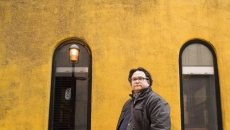The Supreme Court of Canada has decided to hear the appeal of Quebec comedian Mike Ward in a human-rights case that touches on the limits of artistic expression and the role of the country's human rights tribunals.
Ward is appealing a decision by Quebec's highest court that largely upheld a human rights tribunal's ruling requiring the comedian to pay damages to a disabled singer he mocked. As is customary, the Supreme Court gave no reasons for why it decided to hear the case.
The Quebec Court of Appeal ruled last November that Ward's comments about Jeremy Gabriel's disability compromised the young performer's right to the safeguarding of his dignity and could not be justified, even in a society where freedom of expression is valued.
In a 2-1 decision, the court said "comedians must nevertheless realize that artistic freedom isn't absolute and they are, like all citizens, responsible for the consequences of their actions when they exceed certain limits."
A 2016 Quebec Human Rights Tribunal ruling had ordered Ward to pay $35,000 in moral and punitive damages to Gabriel based on comments he made during shows between 2010 and 2013.
Gabriel has Treacher Collins syndrome, a congenital disorder characterized by skull and facial deformities. He became a celebrity in Quebec after he sang with Celine Dion and for the Pope.
In his act, Ward joked he thought Gabriel's illness was terminal and people were only nice to him because he would soon die. Ward then joked that after he realized the child was not going to die, he tried to drown him.
Julius Grey, a human-rights lawyer who represents Ward, said he and his client are relieved by the Supreme Court's decision.
Quebec's human rights commission can only act, Grey said, if someone is the victim of discrimination. At issue, he explained, is whether making fun of someone's disability is a form of discrimination. Grey said the ruling will have an impact on all of Canada's human rights tribunals.
The other important question the country's highest court will have to debate, Grey said, is what effect discriminating words have on freedom of expression. "There are not many cases on artistic content and it's extremely important for the Supreme Court, I think, to guide Canadians with respect to the limits of artistic and other expression," he said.
Grey said the dissenting voice in the Appeal Court decision demonstrates his case is strong. Justice Manon Savard disagreed with her two colleagues, writing that Ward's jokes were "shocking and degrading," but they did not amount to discrimination.
"The appellant's words do not convey discriminatory discourse and do not seek to arouse in his audience a belief that the dignity of the respondent, Jeremy Gabriel, because of his disability, is of less value."
Ward has defended himself on Twitter, saying comedy is not a crime. "In a 'free' country, it shouldn't be up to a judge to decide what constitutes a joke on stage," Ward has tweeted. "The people in attendance laughing already answered that question."
Meissoon Azzaria, spokeswoman for Quebec's human rights commission, said the agency "takes note" of the court's decision. "The issues debated are important for society in order to clarify, in particular, the balance between freedom of expression and the right to equality ... regarding the protection of one's dignity, honour and reputation."
Gabriel did not immediately respond to a request for an interview.
Grey said it will take about one year for the parties to be ready to plead before the Supreme Court.





.jpg)
